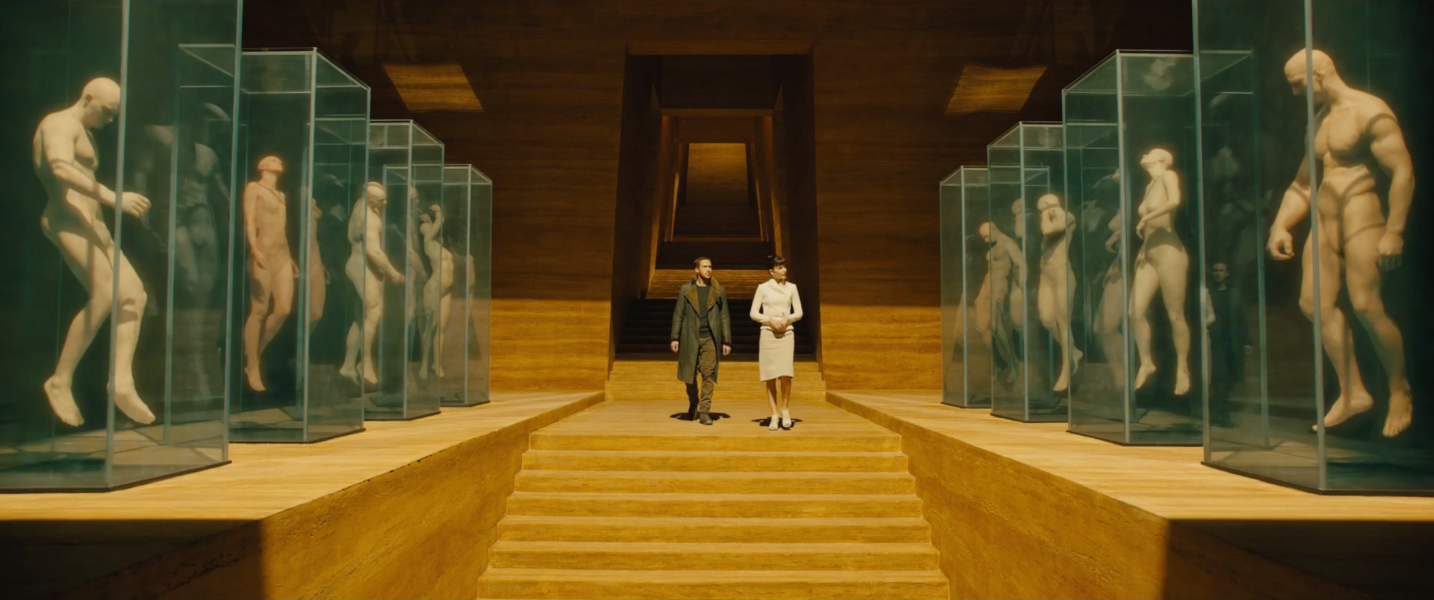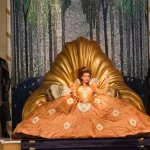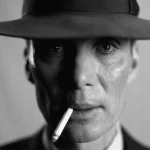Blade Runner 2049: Search for Significance, by Tyler Smith
To say that Denis Villeneuve’s Blade Runner 2049 is a worthy follow-up to Ridley Scott’s 1982 science fiction classic would be an understatement. It is, in many ways, a beautiful continuation of the original film’s story and themes. Where it easily could have been a cash grab or soft reboot, it opts instead to tap into what made the first film so memorable. The result is a film that is thematically complex and visually astounding.
Thirty years after the events of the first film, a new generation of Replicants has been created by megalomaniac Niander Wallace (Jared Leto). These new Replicants are much more agreeable than the previous batch; so much so that some are even employed as Blade Runners, tasked with tracking down any older models and “retiring” them. One such new Replicant is “K” (Ryan Gosling), trying his hardest to live a human life, complete with girlfriend, Joi (Ana de Armas). That Joi is actually a computer program that has learned and adapted to K’s relational requirements should tell you all you need to know about the bleakness of his life. Early on in the film, in his investigative duties, K uncovers a skeleton belonging to a long-dead Replicant. However, it is discovered that this particular Replicant actually gave birth to a child. Such a revelation would change the way Replicants are seen – and, in some cases, exploited – around the world. In K’s search for the missing child, he finds himself on the trail of Deckard (Harrison Ford), the hero from the first film who fell in love with a Replicant and disappeared.
There is a lot to sift through there, and that is as it should be. The first film dealt with Replicants struggling with their own inherent inhumanity – how could they possibly feel these emotions and think these thoughts if they aren’t even a little human? – and questioning what the real difference might be. With Blade Runner 2049, the line between human and inhuman is blurred even more, possibly to the point of irrelevance. Replicants are used primarily as slaves and servants, doing the bidding of their human masters. This is seen as acceptable precisely because Replicants are seen as machines, invented by humans; no different than a car or a toaster. But if these things could procreate? That’s a different story. The dynamic between humans and Replicants would be changed forever, which is why this lost child is so vital and dangerous.
Where this film might actually improve upon its predecessor is in its character developments. While Deckard was interesting enough in the first film, the supporting characters were what really drove the film. Roy Batty, Eldon Tyrell, J.F. Sebastian, and others. It always spoke volumes to me that the Replicants in that film were more emotionally dynamic than the lead, and, in this new film, they’re able to retain that beat and elevate it by making the lead a Replicant himself. K’s life is extremely lonely. He knows what he is and what he is supposed to do. He tries to snatch whatever happiness and identity he can get wherever he can, but it only underlines the vaguely pitiful nature of his life. Once K starts to investigate this mysterious Replicant child, he becomes invested in something for the first time in his life. You can see the curiosity, which gives way to excitement, which eventually leads to obsession. The implications of this discovery will give him the personal significance that he has always wanted; the significance that has always been reserved exclusively for humans.
As K, Ryan Gosling gives a very strong performance. Jokes have been made in the past about what was seen as a limited acting range, particularly in films like Drive, Only God Forgives, and The Place Beyond the Pines. It’s true that Gosling often falls into the “strong and silent” roles, likely because his ability to emote almost solely through his deeply wounded eyes allows him to play stoic characters without sacrificing emotional resonance. It serves him well here, as we are meant to see a slave – previously commended for his lack of resistance – with a deep well of volatile emotions and constant yearning. To play a new Replicant is to put self control above all else, and Gosling inhabits this character in a way that manages to both humanize and dehumanize in equal measure.
The other actors also turn in remarkable performances. Jared Leto, that most divisive of actors, utilizes his natural hamminess to play the eccentric and brilliant Wallace, whose interest in Replicant procreation – as both scientifically fascinating and a very effective way to keep up with market demand – drives his every action. His performance is cold and unnerving, precisely because of its zen-like calm and purposeful tone. Sylvia Hoeks plays Luv, Wallace’s personal Replicant who assists in the more unpleasant of tasks, such as disposing of anybody that asks the wrong questions. I have to commend Hoeks’ commitment, as I viewed her character with absolute disdain. The perverse pleasure that Luv appears to take in inflicting pain is mixed with the joy she gets from serving her master. There is something pathetic about Luv – as there is about all Replicants – but that doesn’t keep us from hating her, possibly even more than Wallace himself. Ana de Armas, as Joi, K’s digital girlfriend, might be the most tragic character of all. She is, for all intents and purposes, the slave of a Replicant, marking yet another level of identity crisis. Joi might be the most human in the film, in a way that mirrors the previous struggles of Replicants themselves. Ana de Armas delivers a sweet and vulnerable performance.
Then, lastly, there is Harrison Ford, who seems to have finally come alive, as he has returned to films and characters that appear to have really meant something to him. His performance as Han Solo in The Force Awakens was the most charming and vibrant we had seen Ford in quite some time. Ford’s Deckard is, to borrow a phrase from another notable Ford film, the shadowy reflection of Han Solo. He’s a loner with no real place in this larger world. In the previous film, this just meant that Deckard could do his job as a Blade Runner very well. Now, though, it just means he is lonely, angry, and tired. But underneath the gruff exterior – which Ford has perfected playing, even in his real life – is a wellspring of hurt and longing, not unlike K. Perhaps it is simply the fate of a Blade Runner to face the more broken and tragic side of living, and absorb all the twisted realities of that life.
Blade Runner 2049 also continues the mesmerizingly beautiful visuals of the first film, with cinematographer Roger Deakins in top form, lovingly and clinically framing monolithic buildings and dead landscapes. It would appear that 2049 Los Angeles has been meticulously designed, and then forgotten about by anybody that truly matters. But the buildings remain, gargantuan and empty (figuratively and literally). The dynamic color palette features deep pinks, greens, blues, reds, oranges, and all the others, making this world seem particularly surreal and, at times, nightmarish. Deakins already has an impressive catalog of films that he has made look absolutely stunning, and Blade Runner 2049 is a worthy addition to it.
I do have one or two complaints about the film. The first might be more of a personal preference, though. Ridley Scott’s Blade Runner is certainly a science fiction film, but it also contains many elements of film noir, which adds a seediness to the dystopian proceedings. This new film mostly abandons the noir qualities and instead embraces pure sci fi. I don’t know if this can officially be filed under “flaw” so much as “that’s a shame.” Villeneuve has shown himself quite capable of handling noir-esque elements in Prisoners and I think he could have incorporated that tone into this film very successfully. But that could just be me; I have a soft spot for film noir, especially when it is mixed with other genres.
My second quibble comes from the film’s pacing. At a healthy 163 minutes, Villeneuve does not feel the need to move things along quickly. It is deliberately paced; meditative, even. I love this. It gives the audience enough time to explore every inch of the frame while also letting the weight of this story really settle in. With films like Enemy and Arrival, Villeneuve has shown himself to be an extremely patient director.
However, I don’t think I’ll be surprising anybody when I say that the film does set itself up for a sequel, and a fairly interesting one at that. If it is anything like this film, I’ll be thrilled to see it. Unfortunately, as the film starts to set these elements up, it abandons its stark plotting and minimalist dialogue in favor of abrupt, clumsy exposition. These scenes come out of nowhere and stick out like a sore thumb. Though Villeneuve does what he can to make them interesting, there is no doubt in my mind that their entire purpose isn’t to deepen our experience of this film so much as tease us into seeing the next one. Blade Runner 2049 is a film unlike any others in the theater right now, but in these moments, it seemed particularly run-of-the-mill.
But, small issues aside, this film is truly special. It does what a sequel should do. Instead of just rehash the same story, it builds upon it, expanding the world and exploring its themes. Denis Villeneuve has made a film that is every bit as engaging as the original, and one that is maybe even a bit more human. And as we deal with characters who strive to embrace whatever humanity they have inside them, it seems only fitting that this series should do the same.
































As a fan of Blade Runner, I am pleased that this world appears to be in good hands. I desperately look for thoughtful, tense and engaging films that seem to be wholly missing from many modern productions. Terminator, Alien, even Star Trek have benefitted AND suffered both under the new aspects of modern filmmaking. Most contemporary films suffer from over-stuffed effects and NASCAR pacing. Blow something up and do it fast. I think I will enjoy a film that goes slow enough to be visually effective, thematically rich, and character empowered.
So glad to see this review posted. I’ve been avoiding any trailers or even any thoughts about seeing the film until I heard from BP. Bladerunner is a sacred film for me.
I’ll probably see it now though. I was so worried (like the rest of us) that this would be another cash-grab 80’s reboot, but you’ve put those fears to rest. I’m particularly excited about the slow pacing of Bladerunner 2049 because too many modern blockbusters move the plot along at a breakneck pace.
Todd Vanderwerff described K’s role as first appearing to be a Campbellian cliche only to shift into a more noir archetype:
https://www.vox.com/culture/2017/10/9/16433088/blade-runner-2049-spoilers-review
I thoroughly enjoyed Blade Runner 2049. It’s length felt meditative, invoking Tarkovsky. I have been likening it to an experienc; more than just watching a film.
One of the big problems I have is with Wallace’s gratuitous killing of the “defective” replicants. Stupid. And what, do the male ones already have perfectly functioning sperm? It felt like unnecessary violence directed solely at women. That they are the ones who fail, and they don’t deserve to live because of it.
Plus, his goal is that he wants to populate the world, right? Why would he kill ones that basically worked, except for the having babies part? It seemed to be in there purely for shock value. And when they go to such lengths to make him that evil, then why is he totally left out of the 3rd act? There is no consequence for his actions. So what’s the point of his character?